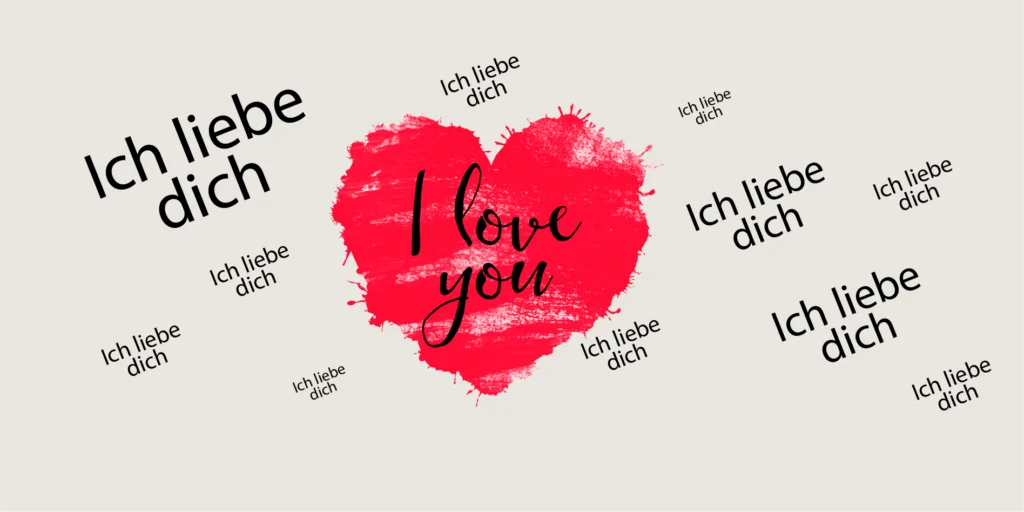Hello everyone! Today, we’re delving into something truly heartwarming: the top ten most beautiful ways to say “I love you” in German. Expressing affection in different languages can be enchanting, and German offers a myriad of beautiful phrases to convey those feelings. Let’s explore these delightful expressions that capture the essence of love in German. Whether you’re learning to
impress a special someone or simply revelling in the beauty of language, these phrases are sure to warm your heart. So, let’s dive into the romantic side of German language together!
How to say “I LOVE YOU” IN German
Let’s kick things off with the quintessential expression: “I love you” in German, beautifully crafted and accompanied by charming images. Words have a profound impact, especially when they convey deep emotions like love. Join me as we explore the nuances and the heartfelt sentiment behind “I love you” in German, enriched by captivating visuals that resonate with the language’s essence. Get ready to immerse yourself in this enchanting linguistic journey!
| English Translation | German Expression |
|---|---|
| I love you | Ich liebe dich |
| I love you too! | Ich liebe dich auch! |
| I have affection for you | Ich hab dich lieb |
| You mean a lot to me | Du bedeutest mir sehr viel |
| I’m totally in love with you | Ich bin total in dich verliebt |
| My heart beats only for you | Mein Herz schlägt nur für dich |
| I adore you | Ich verehre dich |
| I’m fond of you endlessly | Ich habe dich unendlich gern |
| You are the love of my life | Du bist die Liebe meines Lebens |
| My feeling for you is indescribable | Mein Gefühl für dich ist unbeschreiblich |
What are the ways to say I love you in German
Ich liebe dich
“Ich liebe dich” translates to “I love you” in German, but it’s a phrase reserved for your partner or spouse. It’s only suitable for someone you’re very close to, indicating trust and familiarity.
Germans tend to be cautious, using this phrase only when they’re certain. If someone says “Ich liebe dich” to you and you feel the same, you can reply with “Ich liebe dich” or “Ich liebe dich auch” (“I love you too”).
But what if you like someone, but it’s too early for those three words? There are ways to navigate this situation.
Ich bin ich dich verliebt / Ich habe mich in dich verliebt
“Ich bin in dich verliebt” translates to “I am falling in love with you,” while “Ich habe mich in dich verliebt” can be translated as “I have fallen in love with you.”
The differences are subtle; think of the first as a tentative expression of strong like, indicating you’re not fully in love yet but on the way. The second is more definitive, suggesting that the feelings have already developed.
“Ich bin in dich verliebt” may seem more tentative, implying the process is ongoing. Both phrases are often used interchangeably.
Overall, these expressions are vague, serving as a placeholder until you’re certain about your feelings and the person you love.
Ich hab’ dich lieb
Ich hab’ dich lieb” is a German expression that translates to “I love you” or “I have love for you.” However, it’s used in a slightly different context compared to “Ich liebe dich.”
“Ich hab’ dich lieb” is a more casual and affectionate way to express love, often used between family members, close friends, or in romantic relationships to convey affection without the intensity of “Ich liebe dich.” It’s like saying “I care about you” or “I hold you dear.”
While “Ich liebe dich” is reserved for deeper, romantic love, “Ich hab’ dich lieb” is suitable for expressing love and affection in a more relaxed, friendly manner.
Ich mag dich
“Ich mag dich” translates to “I like you” in English. This phrase is used to express a positive sentiment towards someone, indicating that you have a favorable opinion or feeling about them.
Example: Person A: “Was denkst du über Tom?” Person B: “Ich mag ihn. Er ist sehr freundlich und hilfsbereit.”
Translation: Person A: “What do you think about Tom?” Person B: “I like him. He is very friendly and helpful.”
Du gefällst mir
Du gefällst mir” translates to “I like you” or “I find you attractive” in English. It is a direct way to express that you are attracted to someone or that you find them appealing.
Example: Person A: “Wie findest du meinen neuen Haarschnitt?” Person B: “Er gefällt mir sehr gut. Er steht dir wirklich gut.”
Translation: Person A: “What do you think of my new haircut?” Person B: “I like it very much. It really suits you.”

What are German Terms of Endearment
German terms of endearment, or “Kosenamen,” are used to express affection or closeness towards another person. These terms can be used between romantic partners, family members, and even close friends. Here are some common German terms of endearment and their meanings:
| Term | Meaning | Usage | Example |
|---|---|---|---|
| Schatz | Treasure, Darling | Commonly used between romantic partners | “Gute Nacht, Schatz.” (Good night, darling.) |
| Liebling | Darling, Sweetheart | Used between romantic partners | “Du bist mein Liebling.” (You are my sweetheart.) |
| Hase/Hasi | Bunny, Bunny Rabbit | A cute and affectionate nickname | “Komm her, Hasi.” (Come here, bunny.) |
| Maus | Mouse | Similar to “sweetheart” or “darling” | “Danke, Maus.” (Thanks, sweetheart.) |
| Engel | Angel | Expresses admiration or affection | “Du bist mein Engel.” (You are my angel.) |
| Bärchen | Little Bear | Endearing way to refer to someone | “Gute Besserung, Bärchen.” (Get well soon, little bear.) |
| Schätzchen | Little Treasure | Playful expression of affection | “Hast du Hunger, Schätzchen?” (Are you hungry, little treasure?) |
| Herzchen | Little Heart | Cute and endearing nickname | “Gute Nacht, Herzchen.” (Good night, little heart.) |
These examples illustrate how these terms of endearment are used in everyday conversations to express love, affection, and closeness.
I Love You in German – German Verbs Related to Love
Lieben in German: Understanding the Verb “to Love”
In the German language, “lieben” is the verb for “to love.” When using this verb, the direct object, which is the person you love, takes the accusative case.
How to write Expressions of Love in German
- Ich liebe meinen Mann / meine Frau. – Translates to “I love my husband / my wife.”
- “Liebst du mich?” – Means “Do you love me?”
- “Ja ich liebe dich.” – Responds with “Yes, I love you.”
- “Ich liebe dich auch.” – Expresses “I love you, too.”
- Ich hab’ dich Lieb. – A softer way to say “I love you,” akin to “I love you” in a puppy-like manner.
- Ich mag dich sehr. – Means “I like you very much.”
Love and Luck
In German, there’s a saying, “Glück in der Liebe”, which translates to “Luck in love.” It’s a wish for happiness and good fortune in matters of the heart.
Frequently Asked Questions about Saying "I Love You" in German
Q: How do you say “I love you” in German?
A: “I love you” translates to “Ich liebe dich” in German.
Q: How do you respond to “I love you” in German?
A: You can respond with “Ich liebe dich auch,” which means “I love you too.”
Q: Is there a casual way to express affection in German?
A: Yes, you can say “Ich hab dich lieb,” which is similar to saying “I have affection for you.”
Q: How do you express deep feelings of love in German?
A: You can say “Du bedeutest mir sehr viel,” which means “You mean a lot to me,” or “Ich bin total in dich verliebt,” which means “I’m totally in love with you.”
Q: Are there romantic phrases in German to express love and devotion?
A: Yes, you can say “Mein Herz schlägt nur für dich,” which means “My heart beats only for you,” or “Ich verehre dich,” which means “I adore you.”
Q: How can you express endless fondness for someone in German?
A: You can say “Ich habe dich unendlich gern,” which means “I’m fond of you endlessly.”
Q: What’s a heartfelt way to express someone’s importance in German?
A: You can say “Du bist die Liebe meines Lebens,” which means “You are the love of my life.”
Q: How do you describe an indescribable feeling of love in German?
A: You can say “Mein Gefühl für dich ist unbeschreiblich,” which means “My feeling for you is indescribable.”



